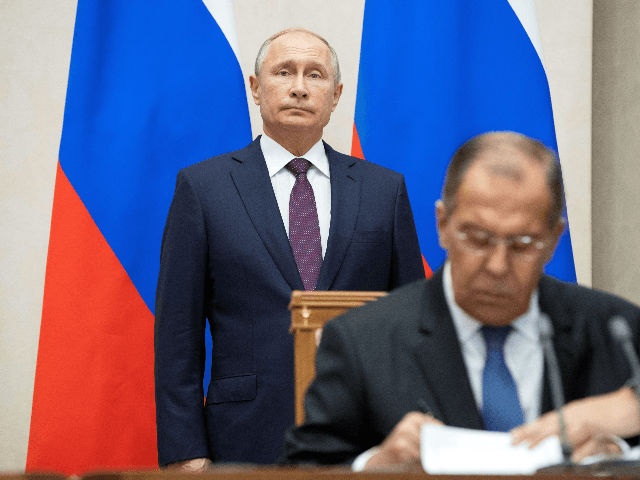The Russian government rejected a Wall Street Journal report on Tuesday claiming it had largely withdrawn its significant military presence in Venezuela, adding that it had not contacted President Donald Trump about any such moves.
Rather than denying it had withdrawn military experts, the state contractor Rostec said it was impossible for it to have withdrawal nearly 1,000 personnel members from the Latin American country because it never had that many in Venezuela in the first place.
The Wall Street Journal claimed in a report Monday that Rostec had withdrawn most of the alleged 1,000 employees it stationed in Venezuela to train and arm troops loyal to socialist dictator Nicolás Maduro. Following the publication of the report, President Donald Trump said on Twitter that Russian officials had notified him that they were pulling out of the country.
The report indicated that Maduro’s inability to pay for Rostec’s services had led to the decision to withdraw. Russia has previously pressured the Maduro regime to pay its debts to the country.
Russia is the Maduro regime’s most vocally loyal ally aside from the rogue communist regime of Cuba, which experts believe has colonized Venezuela through Maduro and his cronies. The Russians recently increased their military presence in the country and have refused to acknowledge the legitimacy of President Juan Guaidó, inaugurated after Maduro’s legal term ended in January.
Rostec said the Wall Street Journal‘s report was impossible because it had never had 1,000 employees in Venezuela and that the newspaper had “overestimated the numbers of Rostec staff in Venezuela by several times.”
“As for technical experts, they come to the country from time to time in order to repair previously delivered equipment and provide technical maintenance,” the statement read. “In recent days, for example, technical maintenance services on several airplanes concluded.”
Kremlin spokesman Dmitry Peskov also responded to President Trump’s statement on Twitter, which did not cite the Wall Street Journal but appeared to have been inspired by it. Peskov told reporters on Tuesday that President Vladimir Putin had not been in contact with Trump, suggesting that the information he posted came from the Journal report. Russia’s presence in Venezuela remained at planned levels, he said, and added, “this process is going according to plan,” according to Russian news agency TASS.
Putin’s government had recently unveiled ambitions for a large military presence in the Caribbean with Maduro’s help. TASS reported in December that Venezuela had agreed to allow Moscow to establish a military base on one of its Caribbean islands, the first such Russian project since the end of the Cold War. Russia also placed nuclear-capable bombers in Venezuela that month but withdrew them shortly after the White House protested.
“Russia is building a security infrastructure in our backyard with Cuba, Venezuela, and Nicaragua,” Senator Ted Cruz (R-TX) said at a security forum in May. “Russia is the [Venezuelan] regime’s largest arms supplier, with upwards of $11 billion in arms sales over the past two decades. … Just last year, Russia deployed two Tu-160 Blackjack nuclear-capable bombers to the Venezuelan military, along with ten attack helicopters the previous year.”
In May, Maduro sent his foreign minister, Jorge Arreaza, to Moscow to request the Russians expand their military presence in the country. As Maduro is no longer the legitimate head of state of the country, he relies exclusively on his control of the military to repress peaceful protesters and keep Guaidó from exercising his constitutional powers.
Multiple reports have also accused Russia of aiding Venezuela in breaching sanctions on its oil industry. The U.S. Treasury Department has placed extensive targeted sanctions on the Maduro regime, most of them on the personal bank accounts and travel privileges of Maduro, his family, and his closest henchmen. It has also attempted to curb the profits of Petróleos de Venezuela (PDVSA), the state-run oil company, which Maduro has independently largely bankrupted.
“The Russians must get out,” U.S. Secretary of State Mike Pompeo said in May. “I’m going to meet with Foreign Minister Lavrov in recent days. It’s very clear, we want the Russians out, we want the Iranians out, we want the Cubans out. It’s very clear.”
Russian officials have claimed they would stay in Venezuela for “as long as needed” to keep the Maduro regime in power, mimicking their policy with dictator Bashar al-Assad in Syria, a longtime Maduro and Hugo Chávez ally.
Russia’s Foreign Minister Sergei Lavrov is currently in Colombia, meeting with his counterpart Carlos Holmes Trujillo to discuss the situation in Venezuela. Lavrov insisted that Russia would continue to play a role in defending Maduro, despite it being on the other side of the world and suffering none of the repercussions Colombia has in the demise of its neighbor. Colombia has taken in the largest number of the upwards of 3 million Venezuelan refugees that have fled the country and seen the rise of criminal Marxist gang activity on its border.
“The response to the question of until what degree Russia will support Venezuela lies in the framework of the international law. There’s the UN Charter and we will demand that the crisis was settled solely based on it,” Lavrov said in a press conference with Holmes.
Holmes used his time to demand that Maduro step down and Venezuela experience “a transition and the calling of elections,” which Lavrov did not support.
Holmes was later forced to deny Russian claims that Colombia was looking to buy military equipment from Moscow.
“That never happened. It did not happen like that in the private meeting with Foreign Minister Lavrov, or in any extended meeting, or at the lunch that he graciously offered us and that Russian and Colombian officials attended,” Holmes said. “It is not true.”

COMMENTS
Please let us know if you're having issues with commenting.